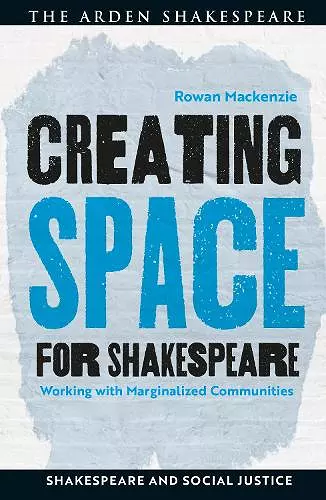Creating Space for Shakespeare
Working with Marginalized Communities
Rowan Mackenzie author Matthieu Chapman editor Dr David Ruiter editor
Format:Hardback
Publisher:Bloomsbury Publishing PLC
Published:9th Mar '23
Currently unavailable, and unfortunately no date known when it will be back

This book builds on years of experience of working with marginalized groups to consider the way Shakespeare can be used by and with incarcerated people, people with mental health issues, people with learning disabilities and people who have experienced homelessness.
Applied Shakespeare is attracting growing interest from practitioners and academics alike, all keen to understand the ways in which performing his works can offer opportunities for reflection, transformation, dialogue regarding social justice, and challenging of perceived limitations. This book adds a new dimension to the field by taking an interdisciplinary approach to topics which have traditionally been studied individually, examining the communication opportunities Shakespeare’s work can offer for a range of marginalized people.
It draws on a diverse range of projects from across the globe, many of which the author has facilitated or been directly involved with, including those with incarcerated people, people with mental health issues, learning disabilities and who have experienced homelessness. As this book evidences, Shakespeare can be used to alter the spatial constraints of people who feel imprisoned, whether literally or metaphorically, enabling them to speak and to be heard in ways which may previously have been elusive or unattainable.
The book examines the use of trauma-informed principles to explore the ways in which consistency, longevity, trust and collaboration enable the development of resilience, positive autonomy and communication skills. It explores this phenomenon of creating space for people to find their own way of expressing themselves in a way that mainstream society can understand, whilst also challenging society to ‘see better’ and to hear better. This is not a process of social homogenisation but of encouraging positive interactions and removing the stigma of marginalization.
Creating Space for Shakespeare offers a vivid, clear-sighted, praxis-oriented account of what has been termed 'applied Shakespeare' - projects which harness the Shakespeare canon and its cultural capital to a range of benign social purposes. While some Shakespearean scholars limit themselves to trying to speak with the dead, Mackenzie shows how the plays can enable us to speak with hitherto excluded categories of the living. * Michael Dobson, Shakespeare Institute, UK *
What place can Shakespeare have for the most vulnerable sections of our society? If your answer is that he stands only for an imposed high culture, Rowan Mackenzie’s remarkable and deeply moving account of the part his plays can occupy in a wide range of kinds of marginalized communities will make you think again. This compassionate survey of her own work and that of many others redefines what Shakespeare means in 21st century Britain. * Peter Holland, University of Notre Dame, USA *
Rowan Mackenzie has written a remarkable book, made even more so by her thorough academic research combined with an accessible approach. We are taken on a creative journey through several prison institutions, each unique in their own way, as are the inhabitants, individuals who embark on their own creative journey. Too often attitudes prevail that such populations do not deserve Shakespeare, let alone drama. However the drama holds the very key to change, and Shakespeare a very specific form of drama to facilitate this change. The hard hitting challenges and the profound insights are all the result of applied Shakespeare. Rowan writes with understanding and compassion and her love of her work is constantly demonstrated. We are there in the workshop or performance, witnessing these remarkable events! This book should be read by dramatherapists and all arts and creative arts therapists, educators and clinicians who work in associated forensic fields. Ideally it should be recommended as a model for both practice and research, in prevention as well as rehabilitation. It is a gem of a book! * Sue Jennings, Visiting Professor of Arts Therapies, University of Derby, UK *
ISBN: 9781350272651
Dimensions: unknown
Weight: unknown
280 pages